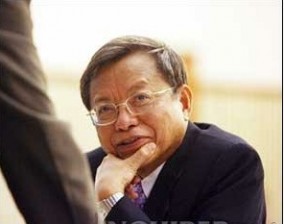Filipinos urged to fight for socio-economic rights

Former Chief Justice Reynato Puno. INQUIRER file photo
MANILA, Philippines—Filipinos must be able to demand from the government the implementation of their right to housing, right to education, or right to health, or else these socio-economic rights would remain mere words on paper, according to retired Chief Justice Reynato Puno.
“We all know that a right that has no remedy is not a right at all,” Puno said.
Puno said the traditional mindset of the non-enforceability of these socio-economic rights—that these are not demandable from the government— must be changed, and he implored a group of people’s lawyers to take up the battle to change this view.
Speaking at the general assembly of the National Union of Peoples Lawyers, Puno noted that all these socio-economic rights are enshrined in the Constitution, but added that these would serve no purpose if people could not ask that these be enforced.
“But even while they are embedded in the Constitution, they are no better than paper rights because they cannot go to any government authority, they cannot go to the legislature, they cannot go to the executive, they cannot go to the Supreme Court and demand that their socio-economic rights be implemented,” he said.
Puno said the traditional view of socio-economic rights not being demandable, unlike civil and political rights, is a doctrine that is followed not just in the Philippines but also in most democratic countries.
One manifestation of this is the President’s veto of the bills putting in place the Magna Carta of the Poor and the bill protecting the rights of internally displaced persons.
The President rejected both bills essentially because socio-economic rights are not supposedly demandable, and because of lack of funding to support the enforcement of these rights.
The Supreme Court also adheres to such a mindset, the retired top magistrate noted, citing its dismissal of the petition questioning the tuition hikes, which is premised on the right to education.
But Puno said that there is a growing trend against this traditional understanding, coming from the constitutional court of South Africa, the Supreme Court of India, and United Nations agencies.
He cited in particular the case of Irene Grootboom, a South African housing activist who sought relief from the high court and filed a case against the government after it failed to respond to applications for housing assistance, and after it demolished the shacks that Grootboom and her neighbors were occupying.
The high court granted some of the reliefs that Grootboom sought.
The high court ruled that African children were entitled to the provision of shelter by the appropriate government agency, and that African parents were entitled to be accommodated with their children in their shelter. It also said the appropriate department of the state was obliged to provide the African children and their parents with such shelter until such time as the parents were cable to shelter their own children.
The ruling sent “shockwaves” through South Africa, and was later appealed to the constitutional court.
The constitutional court ruled that the issue raised was justiciable or could be entertained. It said the poor people could go to court and ask that their socio-economic rights, in this case the right to housing, be implemented by the appropriate government officials.
It also said the fact that the enforcement of these rights would give rise to budgetary applications did not mean that the case could not be entertained.
It further ruled that the state had to put in place a comprehensive and workable plan to meet its housing obligations.
With this landmark ruling, the constitutional court of South Africa eliminated a distinction between civil and political rights and socio-economic rights with respect to their demandability from the state, Puno noted.
Puno said everybody should take part in the endeavor to help the “roofless, the shirtless, and the shoeless in our society,” and said Philippine lawyers could do this by battling the traditional mindset against the enforcement of socio-economic rights.
“One way is to exert all efforts to change our existing laws and decisions of the court still clinging to the traditional concept that the socio-economic rights of our people cannot be demanded from the government as a matter of right,” he told the NUPL members.














